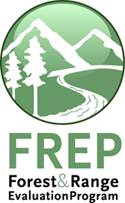Lesson 2 - Training & Field Preparedness
Objective
The objective of this lesson is to prepare participants for successful training and field work.
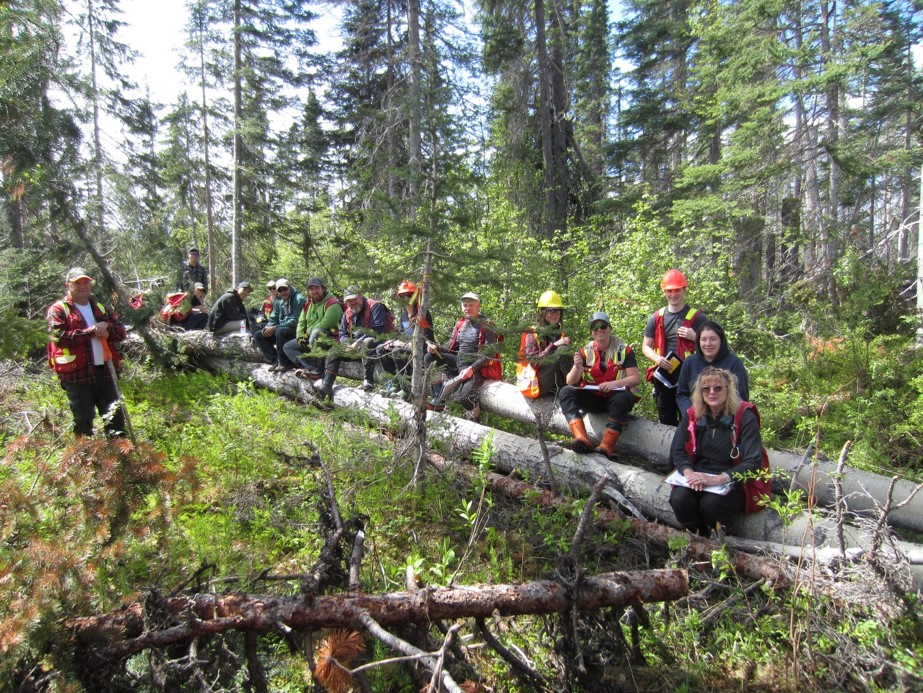
Training Format & Agenda
The RREE training is available in two formats: Full Training and Refresher Training. Full training is intended for anyone wishing to conduct RREE assessments for the first time, or for people who have had the training but have not undertaken assessments on their own. Refresher training is intended for persons who have had the full training and some field experience but wish to be updated because of a lengthy gap in time since their last field assessments.
Unless otherwise indicated, the 1st day of either training will start at the District office at 8:30am with an introductory PowerPoint presentation. This will be followed by a field skills session, preferably from the District’s FREP plan, at a block selected by the hosting District.
Candidates needing to conduct RREE assessments need to realize that the computer-based training and the formal training are covering the basics. In the field, each stream and treatment will be slightly different than what was covered in the training. Therefore, working with a team of experienced assessors is advised for the newcomer. Experience shows that a person begins to perform confidently and proficiently once they have participated in the completion of 7-10 RREE assessments AFTER attending the training.
Preparing for Training
It is mandatory that anyone signing up for RREE training takes the time to pre-read the protocol and field guide. These are available on-line as a PDF document and do not need to be printed. If you plan to bring an iPad to training, then load these documents onto your iPad. It is also an advantage to familiarize yourself with the checklist (FS1248 in the most current version), which is a set of field cards for recording all your observations and measurements. These field cards will be provided at the training, but you should also bring your own blank waterproof note paper (2-4 sheets) in your 6-ring field book for note-taking purposes.
Equipment & Supplies
Equipment you will require to conduct RREE field work (and training):
District FREP Kit: During training you will be introduced to the field skills required of the evaluator. There is a variety of field equipment that will be useful to bring to training. Each District has a FREP ‘kit’ with all the tools required for any and all resource assessments.
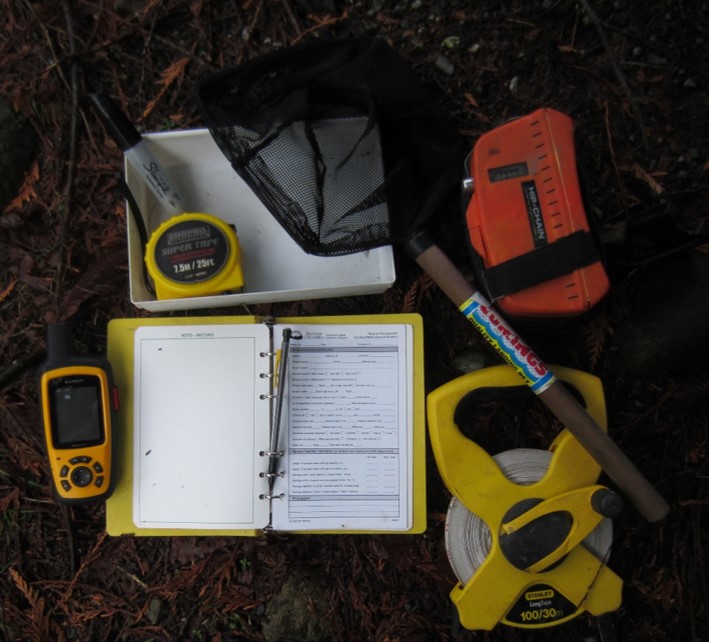
Personal Field Gear: The most useful equipment EACH member of an evaluation team should bring to training is a 6-ring field notebook (with blank waterproof note paper), pencil, permanent felt mark, roll of flagging tape, a 3m carpenter tape and a pocket calculator. Each district team is required to have a FREP pH/temperature gauge, a clinometer and a FREP standard benthic invertebrate dip net and white tray. Additionally, each team will need a 20m tape (nylon eslon or steel logger’s tape).
Optional, but useful equipment includes a pocket magnifying glass, a digital rangefinder, pocket camera, and nylon-thread hip-chain box (with a spare roll of thread) and plant identification resource books (especially for invasive plants).
Bag lunch & refreshments: In addition to the above equipment, each person will need to bring a bagged lunch, refreshments, and snacks.
Layered Clothing, Footwear & Miscellaneous: Persons must dress appropriately for the field work. Layered clothing is essential, as dictated by the weather, but should include a long-sleeved shirt/jacket and full-legged pants. Footwear must include tall rubber boots or rubber caulk boots as a minimum because you will be in the stream to take various measurements. For field work, at least one team member should bring a pair of hip-waders and/or chest waders. If the water levels are high or flows are swift, anyone wearing chest waders should also bring a certified PFD in good working order – although if conditions are such then the assessment should really be delayed until the water levels are low and safer! Also remember to bring insect repellent (season dependent), hi-vis field vest and hard hat.
Preparing for Field Work
Once you have decided to book a field day to conduct RREE assessments there are a few steps to take in preparation to making this day successful.
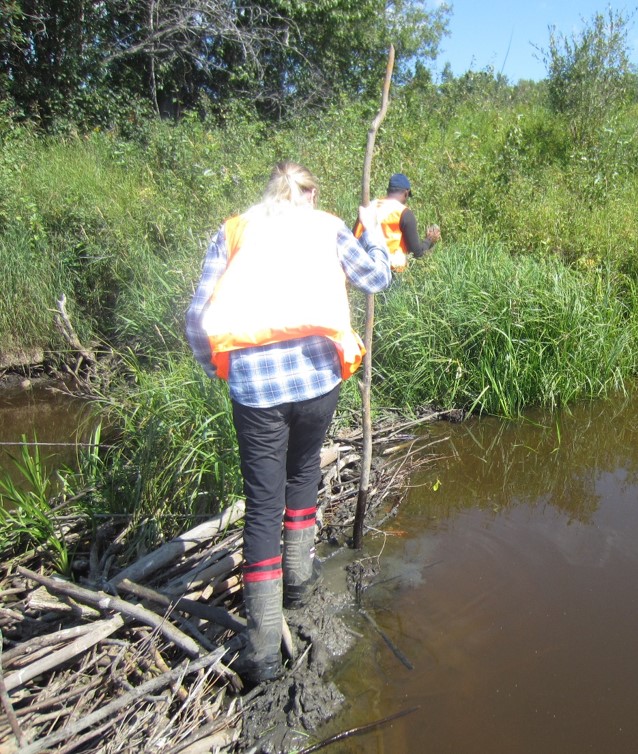
Reserve a vehicle from your fleet, preferably with 4x4 capability and with sufficient seats for the number of persons joining you. On the field day, you will need to conduct a pre-trip vehicle inspection; this is going to take you several minutes, so plan to arrive a bit earlier than the agreed departure time. Be sure to check the vehicle for a spare tire, jack and lug wrench, radio with required channels and first aid kit.
Confirm the departure time with your team the day prior to departure. Enquire of colleagues at the office about road conditions and gates (you may need to sign out a key). Confirm the travel route and ensure you have the map for the field site, and perhaps bring the map for an alternate site in case the selected field site is not going to work.
Perform the safety sign-out and confirm the check-in protocol for your office. Conduct a radio check before leaving the office. If convoying with other vehicles, select a chat channel (e.g., LADD1) and establish a pre-determined pit stop location in case of vehicle separation. Confirm the end-of-day timing constraints, if any, before departing and plan your day accordingly.
Confirm the contents of the District FREP kit prior to departing. Ensure there are spare batteries for the camera, pH/temp tester and that the iPad is fully charged if using it for navigation.
LESSON 2: Self-Check Questions
Answer either True or False to check your understanding.
1. Anyone wanting to go to training can simply take a 1-day refresher.
2. Pre-training course is a suggestion, not a mandatory requirement.
Answers
1: False – Person new to FREP must take the full training; and even then, need to work with experienced FREPers for a season.
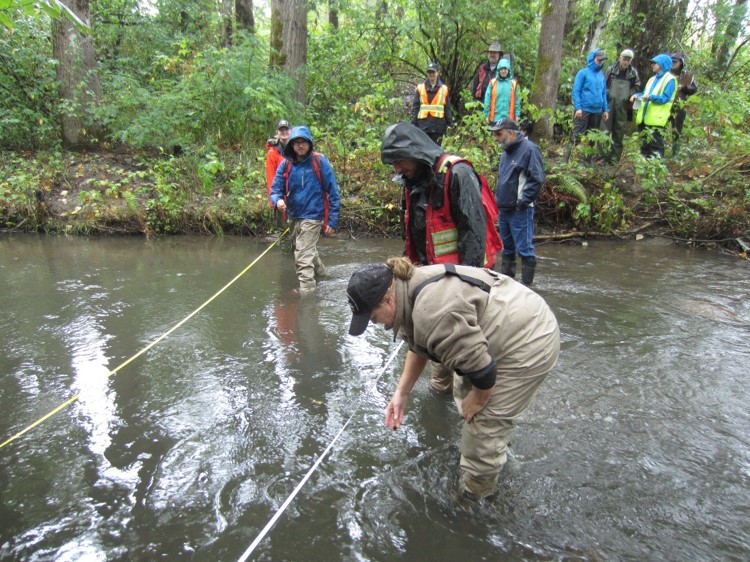
2: False – The pre-training course, including reviewing the protocol, is mandatory to registration and attendance for new field staff at field training venues.

